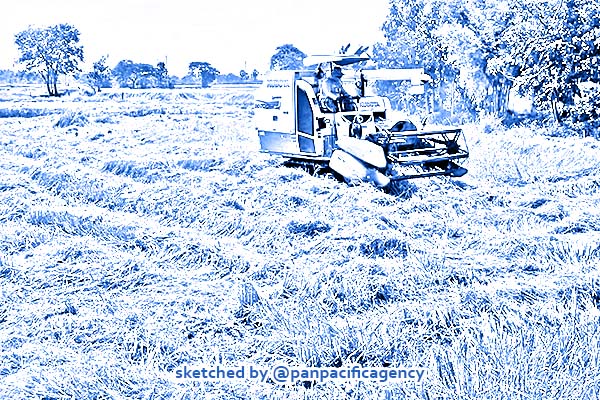Paddy output to decline due to conditions in Thailand

A farmer harvests rice in Kalasin province. Flooding and drought have hampered the 2019-20 growing season. Yongyuth Phuphuangphet. Sketched by the Pan Pacific Agency.
BANGKOK, Nov 28, 2019, Bangkok Post. Thailand’s annual paddy production for both the main and second crops is forecast at 27-28 million tonnes in the 2019-20 season, weighed down by a drop in production for the second crop because of flooding and drought, Bangkok Post reported.
Whichai Phochanakij, director-general of the Internal Trade Department, who on Wednesday chaired a meeting of the subcommittee handling reference prices for rice price guarantees, said paddy output from the second crop is estimated at just 3.5 million tonnes, down 54% from 7.75 million tonnes the previous season, due to drought and inadequate water supply from dams.
Production from the main crop is forecast at 24 million tonnes of paddy, down 4-12.5% from 25-27 million tonnes the previous season.
Some 90% of production from the 2018-19 season was harvested and supplied to the market.
Mr Whichai said that from now until next year the prices are expected to rise, thanks to lower supply and the government’s rice price guarantees.
The government also set aside an additional 70 billion baht to shore up paddy prices, as the annual harvest is scheduled to flood the market this month.
The programmes cover a loan scheme for farmers who agree to delay their paddy; a loan scheme for agricultural cooperatives to gather rice and add value to the grain; soft loans for farmers, farm institutes, agricultural cooperatives and community enterprises to build rice barns and delay paddy sales to stabilise rice prices; and the 3% interest rate subsidy programme for rice traders who agree to hold their stocks for 2-6 months.
The loan scheme for farmers who agree to delay paddy sales will cost an estimated 10 billion baht, and the loan scheme for farm institutes including agricultural cooperatives to gather rice and add value to rice will cost 15 billion baht.
Under the loan scheme for farmers who agree to delay their paddy sales, the government will grant 1,500 baht a tonne with no limits to farmers who keep paddy at their own rice barns. Farmers keeping their output at a farming institute get 500 baht a tonne, while farming institutes get 1,000 baht a tonne.
Farmers are also entitled to earn 11,000 baht per tonne for hom mali rice grown in northeastern provinces and certain provinces in the North, 8,700 baht a tonne for glutinous rice and 9,900 baht a tonne for hom mali grown in other areas, if they bring their output to pledge with the Bank for Agriculture and Agricultural Cooperatives under the barn-pledging scheme.